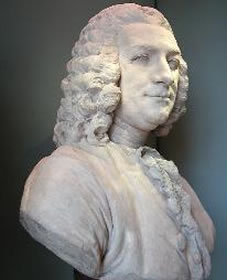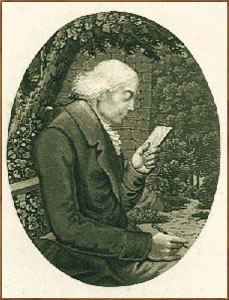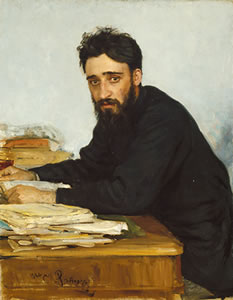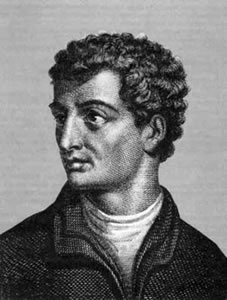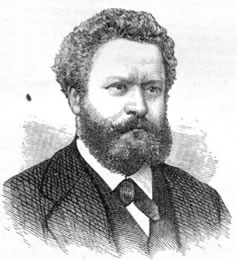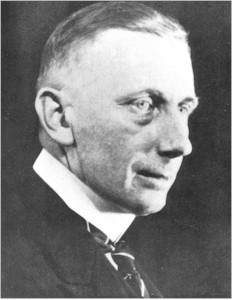De Nederlandse journalist, toneelschrijver, filmacteur en televisiepresentator Ischa Meijer werd geboren in Amsterdam op 14 februari 1943. Zie ook mijn blog van 14 februari 2008.
Uit: De interviewer en de schrijvers (August Willemsen)
“Mijn passie voor Brazilië is ook een haat-liefde. Dat land geeft me zo’n groot gevoel van vrijheid. Tegelijkertijd is het zo moeilijk om daar alleen te zijn. De Brazilianen zitten ontzettend dicht op elkaar. Ze willen voortdurend iets met elkander doen, men moet permanent met iemand naar een of andere gelegenheid, ze zijn de godganse dag aan het telefoneren, afspraken maken – daar kan ik niet zo goed tegen. Het zijn aardige, lieve, hartelijke mensen, maar ze ergeren me ook ontzettend.
Het kost mij überhaupt zo’n ongelooflijke moeite om op mezelf te zijn. Ik heb dat ook nog geprobeerd in de Sahara – maar juist daar bleek het verschrikkelijk moeilijk. Want het ergste wat een mens daar kan overkomen, is dat hij geheel op zichzelf komt te staan. Ik was daar gedurende vijf weken, in ’71. En ik had voortdurend minimaal vier Marokkanen in mijn auto. Die lui bleken ook steeds ergens heen te moeten, ze hebben allerlei ingewikkelde verplichtingen, zoeken permanent contact met elkaar. En daar werd ik uiteindelijk ook weer totaal gek van.
Ik wil gewoon zoveel met mensen omgaan als ik zelf wil.
Met dat stotteren reguleer ik mijn contact; en met de drank doe ik in wezen hetzelfde – het kost mij zo veel moeite om mijn contact met de buitenwereld naar believen te regelen.
Vandaar ook dat ik me zo happy voel in de Bijlmer. Ik kan naar mensen toe als ik daar zin in heb – maar ze komen niet zo gauw op bezoek.
Mijn diepste angst en weerzin geldt: het ouwehoeren. Ik wil niet lastiggevallen worden.“
Ischa Meijer (14 februari 1943 – 14 februari 1995)
De Nederlandse dichter en predikant Piet Paaltjens werd geboren in Leeuwarden op 14 februari 1835. Zie ook mijn blog van 14 februari 2007 en ook mijn blog van 14 februari 2008.
Immortelle ix: Op `t hoekje van de Hooigracht
Op `t hoekje van de hooigracht
En van den Nieuwen Rijn,
Daar zwoer hij, dat hij zijn leven lang
Mijn boezemvriend zou zijn.
En halverwegen tusschen
De Vink en de Haagsche Schouw,
Daar brak hij, zes weken later zoowat,
Den eed van vriendentrouw.
Immortelle c
Zooals ik eenmaal beminde,
Zoo minde er op aarde nooit een,
Maar ‘k vond, tot wien ik mij wendde,
Slechts harten van ijs en van steen.
Toen stierf mijn geloof aan de vriendschap,
Mijn hoop en mijn liefde verdween,
En zooals mijn hart toen haatte,
Zoo haatte er op aarde nooit een.
En sombere, bittere liedren
Zijn aan mijn lippen ontgeleen;
Zoo somber en bitter als ik zong,
Zoo zong er op aarde nooit een.
Verveeld heeft mij eindlijk dat haten,
Dat eeuwig gezang en geween.
Ik zweeg, en zooals ik nu zwijg,
Zoo zweeg er op aarde nooit een.
Piet Paaltjens (14 februari 1835 – 19 januari 1894)
Standbeeld in Leeuwarden
De Amerikaanse schrijver Robert Shea werd geboren op 14 februari 1933 in New York. Zie ook mijn blog van 14 februari 2008.
Uit: The Illuminatus! Trilogy
“In fact, the President of the United States had several severe migraines during the following weeks; but the atheistic rulers of Moscow and Peking were less susceptible to magic. They never reported a twinge. But, wait, here is ano
ther performer in our circus, and one of the most intelligent and decent in the lot-his name is unpronounceable, but you can call him Howard and he happens to have been born a dolphin. He’s swimming through the ruins of Atlantis and it’s April 10 already-time is moving; I’m not sure what Howard sees but it bothers him, and he decides to tell Hagbard Celine all about it. Not that I know, at this point, who Hagbard Celine is. Never mind; watch the waves roll and be glad there isn’t much pollution out here yet. Look at the way the golden sun lights each wave with a glint that, curiously, sparkles into a silver sheen; and watch, watch the waves as they roll, so that it is easy to cross five hours of time in one second and find ourselves amid trees and earth, with even a few falling leaves for a touch of poetry before the horror. Where are we? Five hours away, I told you-five hours due west, to be precise, so at the same instant that Howard turns a somersault in Atlantis, Sasparilla Godzilla, a tourist from simcoe, Ontario (she had the misfortune to be born a human being) turns a neat nosedive right here and lands unconscious on the ground.“

Robert Shea (14 februari 1933 – 10 maart 1994)
De Canadees-Duitse schrijver en vertaler Frederick Philip Grove werd geboren als Felix Paul Greve op 14 februari 1879 in Radomno, Westpruisen. Zie ook mijn blog van 14 februari 2007.
Uit: Settlers of the Marsh
„On the road leading north from the little prairie town Minor two men were fighting their way through the gathering dusk.
Both were recent immigrants; one, Lars Nelson, a giant, of three years’ standing in the country; the other, Niels Lindstedt, slightly above medium size, but compactly built, of only three months’. Both were Swedes; and they had struck up a friendship which had led to a partnership for the winter that was coming. They had been working on a threshing gang between Minor and Balfour and were now on their way into the bush settlement to the north-east where scattered homesteads reached out into the wilderness.
It was the beginning of the month of November.
Niels carried his suitcase on his back; Nelson, his new friend’s bundle, which also held the few belongings of his own which he had along. He wore practically the same clothes winter and summer.
Above five miles from town they reached, on the north road, the point where the continuous settlement ran out into the wild, sandy land which, forming the margin of the Big Marsh, intervened between the territory of the towns and the next Russo-German settlement to the north, some twenty miles or so straight ahead.“
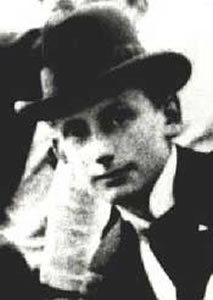
Frederick Philip Grove (14 februari 1879 – 19 augustus 1948)
De Iers-Engelse schrijver, publicist, uitgever en redacteur Frank Harris werd geboren op 14 februari 1856 in Galway, Ierland. Bekend werd hij als redacteur en eigenaar van een aantal Londense kranten en tijdschriften, waaronder de Evening News (vanaf 1883), de Fortnightly Review (1886–1894) als ook de Saturday Review. Harris schreef korte verhalen en romans, waarvan The Bomb de succesvolste en meest gewaardeerde was, twee boeken over Shakespeare en biografieën over zijn vrienden Oscar Wilde en George Bernard Shaw.
Uit: Oscar Wilde His Life and Confessions
„…Miss Travers had applied to Sir William Wilde for money again and again, and accompanied these applications with threats of worse pen-pricks if the requests were not acceded to. It was under these circumstances, according to Lady Wilde, that she wrote the letter complained of to Dr. Travers and enclosed it in a sealed envelope. She wished to get Dr. Travers to use his parental influence to stop Miss Travers from further disgracing herself and insulting and annoying Sir William and Lady Wilde.
The defence carried the war into the enemy’s camp by thus suggesting that Miss Travers was blackmailing Sir William and Lady Wilde.
The attack in the hands of Serjeant Armstrong was still more deadly and convincing. He rose early on the Monday afternoon and declared at the beginning that the case was so painful that he would have preferred not to have been engaged in it–a hypocritical statement which deceived no one, and was just as conventional-false as his wig.“
Frank Harris (14 februari 1856 – 27 augustus 1931)
De Puerto Ricaanse dichteres en schrijfster Julia de Burgos (eig. Julia Constanze Burgos García) werd geboren op 14 februari 1914 in Carolina. Van 1931 tot 1933 studeerde zij aan de Universidad de Puerto Rico. Daarna werkte zij tot aan haar huwelijk als docente.Tussen 1937 en 1939 verschenen drie dichtbundels van haar. In 1940 trok zij naar New Yrok waar zij als journalste werkte. Later in dat jaar begon zij aan een studie literatuur en filosofie in Havanna op Cuba. Tijdens WO II woonde zij in Washington waar zij werkte voor het bereau van de Coordinator of Interamerican Affairs. In 1952 verscheen haar laatste dichtbundel.
I was the most quiet
I was the most quiet,
among those who voyaged to your harbor
No obscene social events announced me,
nor the hushed bells of ancestral reflexes;
my route was the wild music of birds
which flung into the air my kindness…fluttering.
Neither did vessels laden with opulence bear me,
nor oriental rugs support my body;
over the vessels my face appeared
whistling in the wind’s aimless simplicity.
I did not measure the harmony of trivial ambitions
offered by your full-of-promises hand.
I perceived, only, in the depths of my frail spirit,
the tragic abandon hidden in your gesture.
Your constant duality was marked by my avid thirst.
You were like the sea, resonant and discreet.
Over you I spent my wasted hours.
You hovered above, as the sun on petals.
And I strolled in the breeze of your fallen anguish
in the naive sadness of knowing the truth:
your life was a deep struggle of restless springs
an awesome white river rushing to the desert.
One day, by the yellow banks of hysteria,
many ambitious, hidden faces trailed you;
through your surge of tears ripped from the cosmos
other voices encroached without discovering your
mystery…
I was the most quiet.
My voice, hardly an echo.
Conscience difused in a sound of anguish,
dissipated and sweet, throughout all silences.
I was the most quiet.
One who sprang from the earth with no other weapon
but a verse.
I stand before you… stars,
disarmed and gentle… his love in my breast!
Vertaald door Jack Agueros
Julia de Burgos (14 februari 1914 – 6 juli 1953)
De Russische schrijver Vsevolod Garsjin werd geboren op 14 februari 1855 in Prijatnaja Dolina. Zie ook mijn blog van 14 februari 2007.
Uit: The Signal
„Semyon Ivanonv was a track-walker. His hut was ten versts away from a railroad station in one direction and twelve versts away in the other. About four versts away there was a cotton mill that had opened the year before, and its tall chimney rose up darkly from behind the forest. The only dwellings around were the distant huts of the other track-walkers.
Semyon Ivanov’s health had been completely shattered. Nine years before he had served right through the war as servant to an officer. The sun had roasted him, the cold frozen him, and hunger famished him on the forced marches of forty and fifty versts a day in the heat and the cold and the rain and the shine. The bullets had whizzed about him, but, thank God! none had struck him.
Semyon’s regiment had once been on the firing line. For a whole week there had been skirmishing with the Turks, only a deep ravine separating the two hostile armies; and from morn till eve there had
been a steady cross-fire. Thrice daily Semyon carried a steaming samovar and his officer’s meals from the camp kitchen to the ravine. The bullets hummed about him and rattled viciously against the rocks.
Semyon was terrified and cried sometimes, but still he kept right on. The officers were pleased with him, because he always had hot tea ready for them.”
Vsevolod Garsjin (14 februari 1855 – 31 maart 1888)
Portret door Ilya Repin
De Franse schrijver Edmond François Valentin About werd geboren op 14 februari 1828 in Dieuze, Lorrainne. Zie ook mijn blog van 14 februari 2007.
Uit: La Grèce contemporaine
“Le 1er février 1852, je m’ embarquais à Marseille sur le Lycurgue ; le 9, je descendais au Pirée. L’ Orient, qui passe pour un pays lointain, n’ est pas beaucoup plus loin de nous que la banlieue : Athènes est à neuf jours de Paris, et il m’ en a coûté trois fois moins de temps et d’ argent pour aller voir le roi Othon dans sa capitale, que Mme De Sévigné n’ en dépensait pour aller voir sa fille à Grignan. Si quelque lecteur veut s’ épargner la peine de parcourir ce petit livre ou se donner le plaisir de le contrôler, je lui conseille de s’ adresser à la compagnie des messageries impériales : elle a d’ excellentes voitures qui vont à Marseille en trente-six heures, et de fort bons bateaux qui font le voyage de Grèce en huit jours sans se presser. à Paris, à Marseille et partout où je disais adieu à des amis, on me criait, pour me consoler d’ une absence qui devait être longue : ” vous allez voir un beau pays ! ” c’ est aussi ce que je me disais à moi-même. Le nom de la Grèce, plus encore que celui de l’ Espagne ou de l’ Italie, est plein de promesses. Vous ne trouverez pas un jeune homme en qui il n’ éveille des idées de beauté, de lumière et de bonheur.“

Edmond About (14 februari 1828 – 16 januari 1885)
Standbeeld op Père Lachaise, Parijs
De Zwitserse schrijver en dichter Johann Martin Usteri werd geboren op 14 februari 1763 in Zürich. Zie ook mijn blog van 14 februari 2007.
Freut euch des Lebens
Refr.: Freut euch des Lebens,
weil noch das Lämpchen glüht,
pflücket die Rose, eh´ sie verblüht !
Man schafft so gern sich Sorg und Müh´,
sucht Dornen auf und findet sie,
und läßt das Veilchen unbemerkt,
daß dort am Wege blüht.
Wenn scheu die Schöpfung sich verhüllt
und laut der Donner ob uns brüllt,
dann lacht am Abend nach dem Sturm
die Sonne, ach, so schön…
Wer Neid und Mißgunst sorgsam flieht
und G´nügsamkeit im Gärtchen zieht,
dem schießt sie schnell zum Bäumchen auf,
das goldene Früchte trägt…
Wer Redlichkeit und Treue liebt
und gern dem ärmeren Bruder gibt,
bei dem baut sich Zufriedenheit
so gern ihr Hüttchen auf…
Und wenn der Pfad sich furchtbar engt
und Mißgeschick dich plagt und drängt,
so reicht die Freundschaft schwesterlich
dem Redlichen die Hand…
Johann Martin Usteri (14 februari 1763 – 29 juli 1827)
Portret door Franz Hegi Aquatint
Zie voor onderstaande schrijver ook mijn blog van 14 februari 2007.
De Franse toneelschrijver Pierre-Claude Nivelle de La Chaussée werd geboren op 14 februari 1692 in Parijs.









